May 19, 2025 | 14:35 GMT +7
May 19, 2025 | 14:35 GMT +7
Hotline: 0913.378.918
May 19, 2025 | 14:35 GMT +7
Hotline: 0913.378.918
On June 18, the Department of Agriculture and Rural Development of Can Tho City, in collaboration with Vina T&T Trading Services Import-Export Company Limited and the People's Committee of Co Do District, organized a ceremony to announce the first export shipment of green-skinned mangoes from Can Tho City to the Australian and American markets.
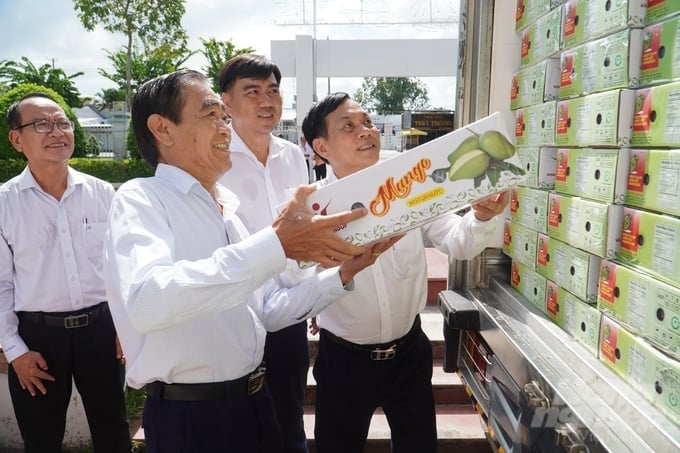
The successful export of the first batch of green-skinned mangoes from Can Tho City to the Australian and American markets is attributed to the negotiating efforts of the Ministry of Agriculture and Rural Development.
The green-skinned mangoes shipment, weighing a total of 2 tons, was transported by air and supplied by the Loc Hung Agricultural Cooperative. Specifically, 1 ton of mangoes was exported to Australia and another ton to the US.
Mr Le Van Thiet, Deputy Director of the Plant Protection Department (Ministry of Agriculture and Rural Development), highlighted that the Mekong Delta region is the largest mango-growing area in Vietnam, concentrated in provinces such as Tien Giang, Dong Thap, An Giang, Vinh Long, and Can Tho City.
Can Tho City alone has over 3,300 ha dedicated to mango cultivation, with an annual supply of nearly 17,500 tons. Farmers predominantly grow green-skinned mangoes and Hoa Loc mango varieties.
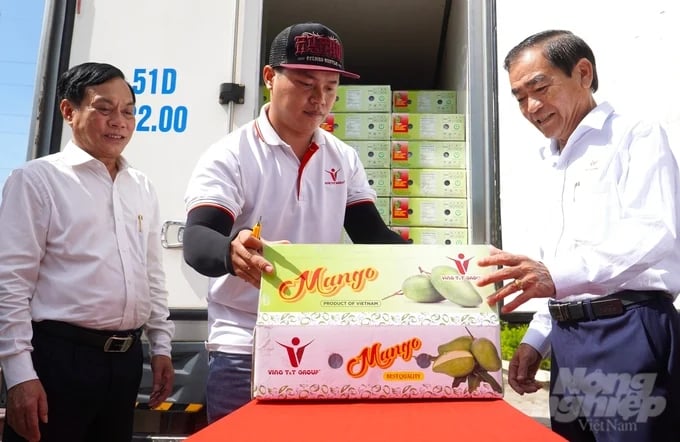
Currently, Vietnamese mangoes have been exported to 40 countries worldwide, ranking 13th in mango production globally. Photo: Kim Anh.
In 2017, Australia accepted the importation of Vietnamese mangoes. By 2019, the United States also approved opening its market to Vietnamese mangoes.
In recent times, the plant protection agencies of the United States, Australia, and Vietnam have held numerous technical meetings and exchanges to harmonize plant quarantine measures for mangoes. As of now, all parties have reached agreements on the import conditions for mangoes and plans for irradiation treatment when exporting from Vietnam. The procedures to open these markets for Vietnamese mango exports have been completed, officially allowing Vietnam to export fresh mangoes to these markets.
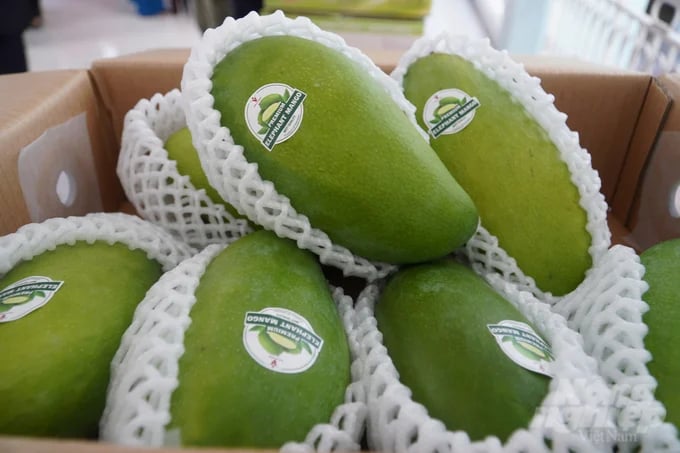
The green-skinned mangoes from Can Tho City are ensuring compliance with food safety requirements and pest management. Photo: Kim Anh.
Mr. Nguyen Ngoc He, Vice Chairman of the People's Committee of Can Tho City, evaluates that the successful export of green-skinned mangoes to the Australian and American markets is the result of efforts and negotiations by the Ministry of Agriculture and Rural Development.
At the same time, this success also reflects the efforts of businesses in securing contracts for exports, supporting farmers in registering planting areas, providing technical guidance, and implementing procurement contracts.
This event marks a transformation in Can Tho's agriculture sector, responding to market demands. The shift from fragmented and spontaneous production methods to closely linked value chains with businesses has led to the establishment of specialized cultivation areas. These areas meet the conditions for management codes, implementing technical production processes that ensure product quality.
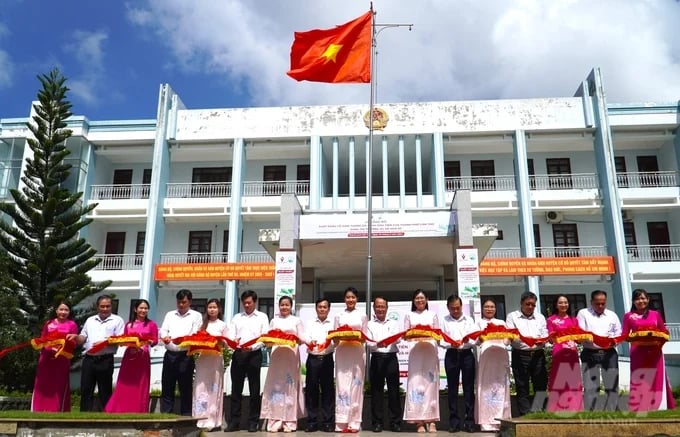
The successful export of Can Tho's green-skinned mangoes to the Australian and American markets opens up a new direction for Vietnamese mangoes. Photo: Kim Anh.
Mangoes are currently the second largest fruit crop in terms of cultivation area in Can Tho City, after durian. To maintain and further enhance these achievements, Mr. He proposed that the Department of Agriculture and Rural Development of the city pay more attention to developing production in concentrated areas and fostering partnerships with agricultural cooperatives (HTX). This would create favourable conditions for businesses to collaborate in building raw material zones that meet export requirements.
Additionally, there is a need to strengthen guidance for farmers to follow proper technical processes, use agricultural chemicals and materials in accordance with regulations, and produce safe, high-quality products.
Mr Phan Van Tay, Director of the Agricultural Cooperative Lộc Hưng, expressed his joy that for the first time, green-skinned mangoes produced by the cooperative have been exported to the "Western domain". Over the years, the mango yield in the commune had to be sold to traders at fluctuating prices, which were often unstable. There were times when green-skinned mangoes were sold for as low as VND 5,000/kg, causing difficulties for the commune's residents in reinvesting in production.
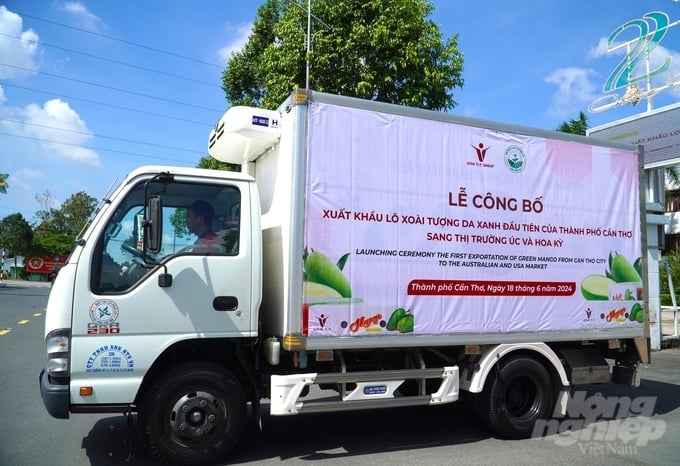
The shipment will be transported to Ho Chi Minh City to undergo irradiation before officially exporting to Australia and the United States. Photo: Kim Anh.
With support from the local specialized agencies, the Agricultural Cooperative (HTX) had the opportunity to collaborate with Vina T&T Company to successfully export the batch of green-skinned mangoes to the Australian and American markets. This achievement brings shared joy to all members of the cooperative, as well as farmers in the Co Do district in general.
Currently, the Loc Hung Agricultural Cooperative has 19 members and cultivates 42 ha of fruit trees, including approximately 22 ha of green-skinned mangoes. Annually, the cooperative supplies between 600 to 700 tons of various fruits to the market.
Can Tho City have about 25,000 ha dedicated to fruit tree cultivation, with 8 types of crops covering areas ranging from over 1,000 to 4,800 ha. In recent years, the city's agricultural sector has focused on developing key fruit-producing areas and creating distinctive branded products such as Ha Chau strawberries, cainito, Phong Dien durians, Hoa Loc sand mangoes, green-skinned mangoes from Song Hau, and Dinh Mon lychees.
The city has established 193 production unit codes, covering a total area of 2,673 ha, which include mangoes, cainito, lychees, rice, and durians.
Translated by Hoang Duy

(VAN) On May 15, Ministry of Agriculture and Environment of Vietnam hosted the 'Connecting Vietnam - Germany agricultural, forestry and fishery trade' seminar in Berlin, Germany.

(VAN) In the face of counterfeit and imitation products, Khanh Hoa Salanganes Nest Company hopes for the prompt completion of the legal framework, strict enforcement against violations, and protection of the bird’s nest brand.

(VAN) Japan's efforts to lower the price of rice through the release of its stockpile may finally be making some progress, albeit at a snail's pace.

(VAN) U.S. tariffs are not only a 'shock', but also an opportunity for Vietnamese businesses to renew their mindset toward comprehensive development.

(VAN) As Bac Giang lychee enters the harvest season, Minister Do Duc Duy expects that the fruit will contribute greatly to agricultural exports due to standardized production and deep processing.

(VAN) Consumers have shown a preference for free-range eggs, but those farming systems are more vulnerable to biosecurity risks like bird flu.
/2025/05/09/5701-1-184335_301.jpg)
(VAN) Vietnam’s eel exports nearly doubled thanks to a mud-free farming model, opening up new prospects while still facing numerous barriers related to international standards.